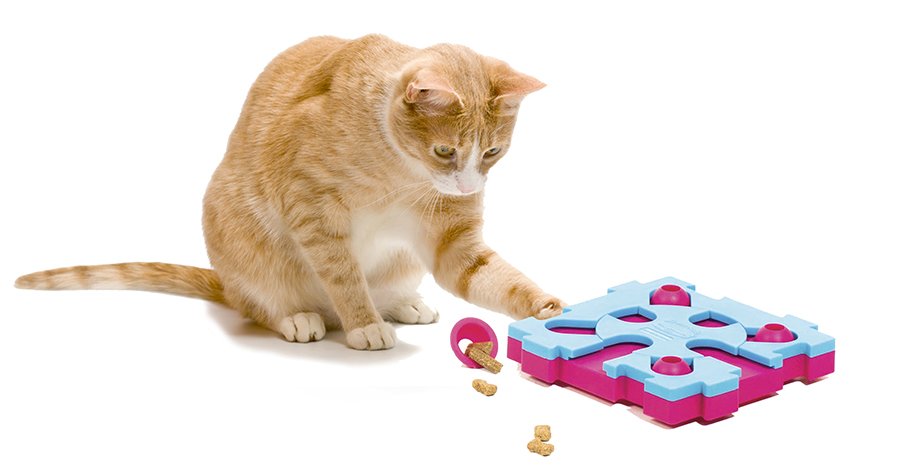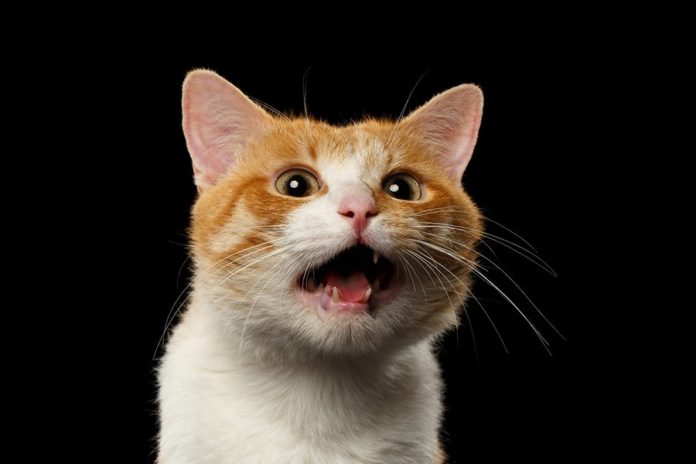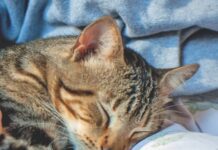Ah, sleep. At the end of a long workday, you look forward to uninterrupted slumber, but your cat has other plans. In two hours, he jars you awake by leaping on the bed — knocking the air out of you. An hour later, he swats a book off your nightstand. And 30 minutes before your alarm sounds, he begins loud, demanding meows.
Frustrated by your feline night stalker? You’re not alone. Fast-growing, play-seeking kittens aren’t the only felines who disrupt their owners’ sleep. Cats who have displayed proper manners at night can suddenly become restless and vocal especially when they become seniors.
Common Complaint.
“We don’t have statistics available, but the issue of cats getting people up in the middle of the night is quite common,” says animal behaviorist Katherine Houpt, VMD, Ph.D., professor emeritus at Cornell University College of Veterinary Medicine. “And there is also the phenomenon of older cats being wakeful in the middle of the night after years of always sleeping through the night.”
Even veterinarians have to contend with the issue. “I definitely have had both geriatric dogs and cats who kept me awake at night,” says Leni Kaplan, MS, DVM, a lecturer in the Community Practice Service at Cornell.
In general, nocturnal species are most active at night. Cats, however, are crepuscular, meaning that they’re awake at twilight. “Cats are not truly nocturnal like many rodents, but feral cats in cities are more active at night when dogs are asleep, enabling them to find food more safely in dumpsters without being stalked by predators,” Dr. Houpt says. “All cats seem to be genetically programmed to be more active at dawn and dusk and this even applies to today’s indoor cats.”
The reasons can also be medical and behavioral. Book an appointment with your cat’s veterinarian for a complete physical exam. “If we do not identify and treat underlying medical causes of disruptive behaviors, we will not be able to fix the behavior,” says Dr. Kaplan.
These conditions top the list of physical reasons for nighttime wakefulness:
1. Cognitive dysfunction syndrome, (CDS), a degenerative brain disease similar to Alzheimer’s in people. It causes altered sleep patterns, among other behaviors. (Please see sidebar.)
2. Hyperthyroidism, a common endocrine disorder resulting from the production of excessive thyroid hormone, occurs in middle-aged and older cats. Those affected develop voracious appetites but experience weight loss. They tend to be more active and vocal. “This medical condition causes hypertension [high blood pressure], increased thirst, increased appetite, increased urination and nighttime vocalization,” says Dr. Kaplan. “Generally, many cats with this condition do not sleep well and disrupt their owners’ sleep. If the cat does not have access to food overnight, he may bother the owner to be fed.”
3. Diabetes typically causes ravenous appetite, weight loss, increased water consumption and urination. As a consequence, cats may awaken in the middle of the night because they’re hungry or the water bowl is empty. Urinary tract infections or bladder stones can also trigger cats to awaken their owner by urinating on the bed, Dr. Houpt says.
Bigstock
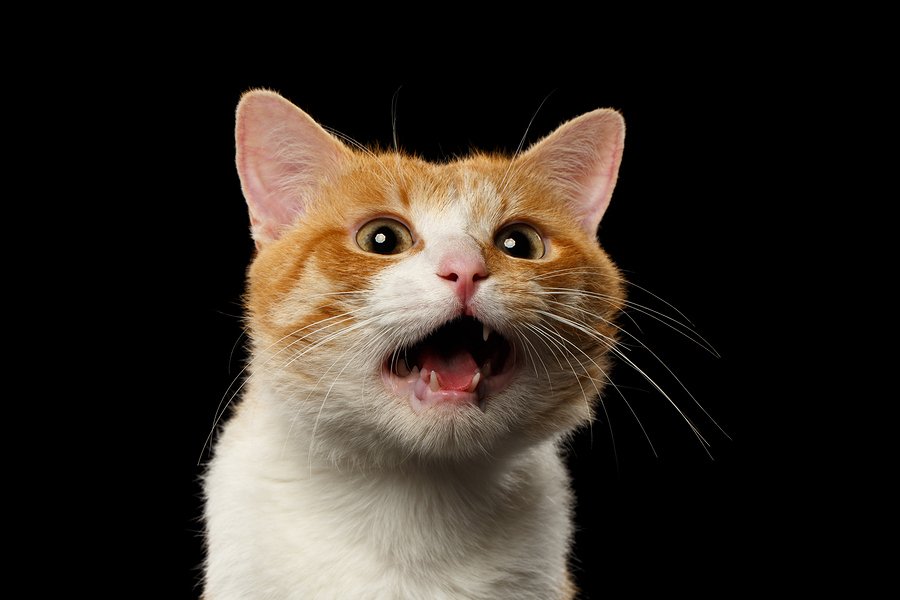
4. Pain due to arthritic joints can make it hard for cats to find a comfortable posture to sleep. “Pay attention to your cat, and if he is starting to limp during the day, get him examined by your veterinarian,” Dr. Houpt says. “He may need pain medication to help him not only move but also to sleep better.”
5. Infestation of fleas, ticks and other parasites. “Painful, irritated and itchy skin will keep animals from sleeping, and they may be stressed because they’re in pain,” Dr. Kaplan says. It warrants a trip to the veterinarian.
6. Side effects from certain medicines. Make of a list of those your cat takes, including supplements, and review them with the veterinarian. “Most medications do not disrupt sleep unless an individual animal has an intolerance or sensitivity to the medication,” Dr. Kaplan says. “For example, just like in people, some antihistamines, including Benadryl, can cause hyper-excitability and anxiety instead of sedation.”
Pets who are hyper-excitable as a side effect of a medication usually can’t settle down. “They will pant, pace, be restless and bother the owner because they are confused and frightened by these side effects.” Dr. Kaplan says. However, she cautions owners not to confuse a medicated cat’s suddenly walking around and interacting more with anxiety. He might simply be happy to be feeling better.
No Early Dinners.
Once medical reasons for your cat’s increased nighttime activity have been ruled out, look for clues pointing to a behavioral reason. It would be helpful to record and report specific changes in your cat, such as heightened nighttime activity, to his veterinarian.
One consideration: Unintentionally, you may be encouraging wakefulness in your cat, especially if you feed him an early dinner and a meal as soon as you awaken in the morning.
“I often recommend that my clients give their pets a late meal before the owner’s bedtime,” says Dr. Kaplan. “This accomplishes two things: The pets are less likely to wake their owners due to hunger, and secondly, this late meal helps pets who are prone to vomiting overnight due to hunger and a long duration between feedings known as billous vomiting syndrome.”
FieldHaven Feline Center
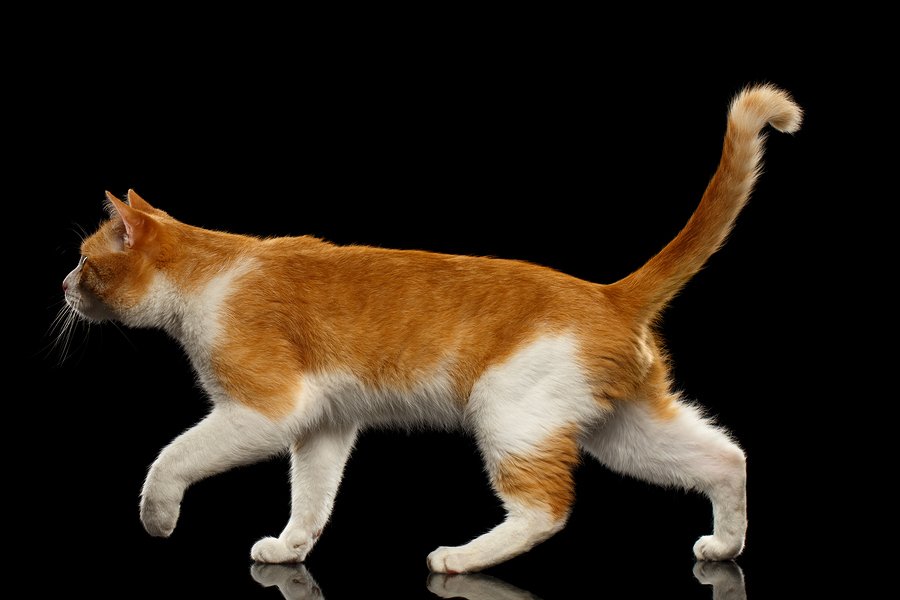
Equally important is delaying feeding in the morning. You need to re-set his breakfast clock. “Otherwise, you are training him to expect to be fed as soon as you wake up and that can motivate some cats to bother you while you are still in bed,” Dr. Houpt says. “You are inadvertently positively reinforcing this unwanted behavior.”
Bored cats can unleash their pent-up energy by scratching furniture at night and batting objects off tables and counters. Effective boredom busters include:
1. Clicker training to teach basic cues like sit, come and shake paws.
2. Introducing a puzzle feeder a cat must manipulate to access a treat inside.
3. Staging mini-play sessions to engage his predator skills, such as a wand toy or a laser tag toy. End the one- to 10-minute sessions by giving him a chance to catch “prey” by tossing a paper wad or soft toy mouse.
Providing play-alone toys like a ball inside a plastic circular track.
“Cats, just like humans, need exercise and an outlet for energy for both their physical and mental well-being,” says Dr. Kaplan.
Nina-Ottosson.com
